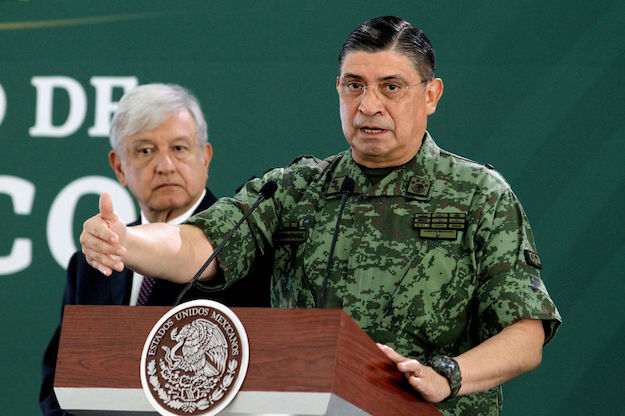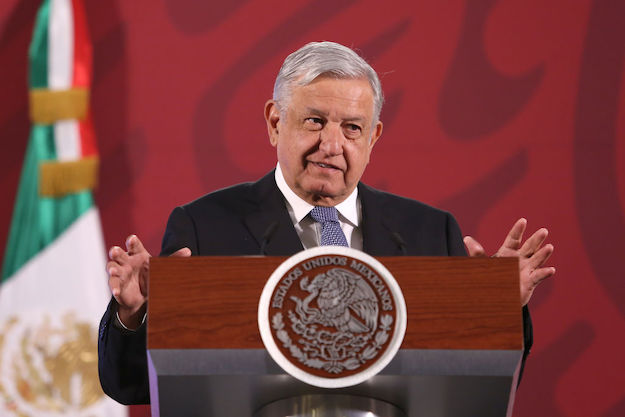The first big win for Andrés Manuel López Obrador’s opposition came less than two months ago, when Mexico’s Senate approved significant changes to the president’s marquee security proposal, the creation of a new National Guard.
Among other changes, the body was to be brought under civilian control, and the military given a 5-year time limit to get out of the policing business. “I’ll be brief: it’s a triumph for civil society,” quipped one prominent activist on Twitter.
Yet the celebratory mood has since turned sour.
On Friday, López Obrador (widely known as AMLO) announced that the head of the Guard, who he’ll name this week, is currently on active duty. Observers see the decision as a betrayal – at least in spirit – of the compromise negotiated in February, and another sign the president has gone all-in on the armed forces as the short-term solution to Mexico’s security problem.
“He has a historic opportunity to build a professional, trustworthy civilian security body, and instead he insists on a military force,” said Catalina Pérez Correa, a professor at Mexico City’s CIDE university. “It’s an unpardonable mistake.”
AMLO’s landslide election victory in July, and the expectations that followed, may help explain his military gamble. He promised the murder rate would drop by at least 30% during his six-year term and is now under pressure to quickly deliver improvements in Mexico’s dire security situation. But his plan carries both long- and short-term risks.
“(In its urgency), the administration seems willing to trade the armed forces’ right to self-govern without real accountability or oversight for their becoming the main pillar of the president’s strategy to reduce violence,” said Falko Ernst, senior Mexico analyst for the International Crisis Group.
Recent history suggests AMLO will face an uphill climb.
In 2006, the year former President Felipe Calderón launched his war on drug cartels, Mexico’s national statistics agency recorded 10,452 homicides. By 2017, with the military deployed to hotspots around the country, that number had risen to 32,079 – and getting worse.
“Even when military operations have succeeded on their own terms – taking out kingpins and fracturing criminal organizations – they’ve backfired,” said Ernst. “The militarization of public security has increased violence and competition between organized criminal groups.”
AMLO says he’ll take a different tack than his predecessors, shifting resources toward ensuring the general welfare. That likely means a focus on crimes like extortion and kidnapping and efforts to make neighborhoods and public transportation safer, while giving less priority to the drug trade itself.
Members of the National Guard, initially some 60,000 troops culled from military and federal police forces, will also receive training in protecting human rights and use of force, with the UN High Commission for Human Rights taking a role. Regarding past abuses, AMLO believes his own honesty, and personally vetting the Guard’s commanders, will have a trickle-down effect on the rank-and-file, Ernst said.
But the military’s recent track record is not encouraging.
Allegations of human rights abuses and extra-judicial killings have damaged the military’s reputation as a cleaner, more disciplined alternative to Mexico’s notoriously corrupt police forces. And military brass has been resistant to oversight. In March, the Army denied a court order to provide information on thousands of confrontations with civilians that have taken place since 2006, saying the records didn’t exist.
“You create a new organizational shell, but then bring in core personnel, including leadership, from other forces, all with their own institutional baggage and deeply rooted culture of collusion, corruption and violence,” said Ernst. “I think AMLO underestimates that culture.”
The law passed in February, which moved command of the National Guard from the Secretary of Defense to the civilian Secretary for Public Security, also stipulates that whomever AMLO names as chief is required to take temporary leave from any military office. Observers worry the provision will do little to prevent military priorities and hierarchies from taking hold.
“Nobody is saying that the military should be taken off the streets immediately,” said Pérez. “But they can’t be in charge of public security … The military isn’t trained to detain people and take them to court, the military is trained to kill enemy combatants.”
—
Russell is a senior editor and correspondent in Mexico for AQ. Follow him on Twitter @BenPaulRussell








